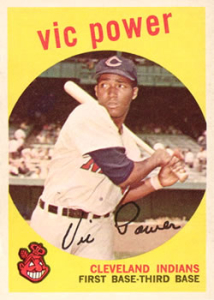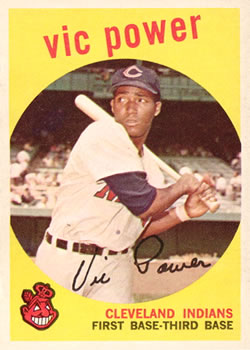August 14, 1958: Vic Power steals home twice in Cleveland’s extra-inning win over Detroit
 The Detroit Tigers headed to Cleveland for a three-game, two-day set with the Indians in August 1958. The Tigers were holding down fourth place in the American League. The Indians were right behind them in fifth. Both clubs, as well as the whole league, were double-digit games behind the first-place New York Yankees. Nobody was catching the Yankees in 1958.
The Detroit Tigers headed to Cleveland for a three-game, two-day set with the Indians in August 1958. The Tigers were holding down fourth place in the American League. The Indians were right behind them in fifth. Both clubs, as well as the whole league, were double-digit games behind the first-place New York Yankees. Nobody was catching the Yankees in 1958.
Not only were both the Tigers and Indians more than 10 games out of first place, but both had made managerial changes since Opening Day. Detroit gave the heave-ho to second-year manager Jack Tighe on June 9 after he posted a 21-28 record. Triple-A manager Bill Norman was promoted to replace him.
Cleveland’s Bobby Bragan, who had been hired shortly after the 1957 season ended, was fired on June 26 as the result of a 31-36 start. He was replaced by Joe Gordon, the starting second baseman on the Indians’ 1948 World Series champions.
So it may have been little surprise that a paltry crowd of 4,474 patrons found their way to 72,000-seat Cleveland Stadium on August 14 for the Thursday matinee that concluded the series.1 Never mind that good seats were available, good sections were also to be had.
It was not a stretch to consider that the Cleveland Browns were outdrawing the Indians. Fans flooded to Hiram College for training camp. And you could not blame them. The Browns had reached the NFL Championship game in seven of the last eight years. Despite the Indians’ success in the 1950s – nine winning seasons in 10 years, six with at least 92 wins – by 1958 they were four years past their only pennant.
George Susce (4-1, 3.05) was tabbed the starter for the visitors.2 The Tigers had obtained Susce on waivers from the Boston Red Sox on May 12, and both Detroit managers had used him as a reliever and a spot starter.
Cleveland countered with Cal McLish (12-6, 2.75 ERA). The veteran right-handed hurler started the season in the bullpen but joined the starting rotation in mid-May.
The Indians used an array of walks and singles to score three runs and knock Susce from the box after just one-third of an inning. Bobby Avila led off with a walk. Mickey Vernon singled to left field, moving Avila to second base. Vic Power bounced a grounder to Detroit shortstop Coot Veal. The play forced Vernon at second and put runners on the corners.
Consecutive singles by Russ Nixon and Minnie Miñoso plated Avila and Power for the first two runs of the game. After Susce walked Larry Doby to load the bases, Norman made the move to his bullpen and brought in Al Cicotte.3 The right-hander did not provide immediate relief; a walk to Rocky Colavito pushed home the third Indians run.
Veal got the Tigers on the board in the second inning with a base hit, driving in Johnny Groth from second to make the score 3-1.
It stayed that way until the top of the fifth inning. With one down, Cicotte – who contributed 3⅔ scoreless innings after his rocky beginning – singled to center field. Harvey Kuenn walked but was forced at second on the next play, a groundball off the bat of Reno Bertoia, as Cicotte took third.
Al Kaline was safe on an infield single, but Cicotte held at third to load the bases. Gail Harris singled to right to knock in Cicotte and Bertoia and tie the score, 3-3.
The Tigers continued their middle-innings surge by scoring four runs against McLish and the Indians in the sixth. The big blow was provided by Kuenn, who smacked his seventh home run, a three-run shot over the left-field wall.
Colavito answered by leading off the bottom of the sixth with a home run off reliever Tom Morgan. The blast was the 25th on the season for Colavito, who had celebrated his 25th birthday four days before the game. After six innings, Detroit held the upper hand with a 7-4 advantage.
Colavito struck again in the eighth, depositing a Morgan offering into the stands for his second home run of the game and 26th of the season.4
It was a 7-5 game, and Gordon went to his bench. Gary Geiger pinch-hit for Woodie Held and worked Morgan for a walk. Gordon again went to his bench, summoning Vic Wertz to pinch-hit for reliever Morrie Martin. Wertz smacked his first home run of the season, tying the score.
Norman now went to his bullpen; Bill Fischer replaced Morgan. Avila hit a groundball to Tigers second baseman Frank Bolling. But Harris failed to step on the bag at first after catching the throw from Bolling, and Avila was called safe. Harris argued so vehemently with first-base umpire Joe Paparella that the ump gave him the thumb.
Tito Francona replace Harris. Avila advanced to second on Vernon’s sacrifice. Power singled to right and Avila slid home safely ahead of Kaline’s throw, putting Cleveland ahead, 8-7.
Power, who had joined the Indians two months earlier as part of the deal that sent Roger Maris to the Kansas City Athletics, took second when catcher Charlie Lau bobbled the throw for an error, The 30-year-old Puerto Rican moved to third on Fischer’s wild pitch.
Not known for being fleet of foot, Power had stolen only one base to this point in the season. Cleveland third-base coach Eddie Stanky took note of Fischer’s slow delivery to the plate. “If you get a good jump, go ahead,” he advised Power.5
Miñoso, who was at bat, said, “I just stood there and let him go.”6 And sure enough, Power took off, sliding home ahead of the throw from Fischer. The act of thievery gave the Indians their fifth run of the inning and a 9-7 lead.
Three outs from victory, Ray Narleski emerged from the Cleveland bullpen to shut the door on the Tigers. It was not to be. Bertoia led off the ninth with a walk and Kaline followed with a single to right field. Gordon replaced Narleski with Don Ferrarese.
Gus Zernial pinch-hit for Francona and stroked a single to left field to plate Bertoia, while Kaline raced to third base. One more time Gordon trudged to the center of the diamond to bring in Gary Bell for Ferrarese. Norman responded by pinch-hitting Charlie Maxwell for Groth.
After Maxwell flied out to left field in foul grounds for the first out, Bolling lifted a fly ball to right. Colavito made the catch and fired the ball home. Kaline tagged up and headed to the plate, in hopes of scoring the tying run.
The ball arrived first. Nixon snagged the throw from Colavito and tagged Kaline, as home-plate umpire Frank Tabacchi gave the “out” signal. But Tabacchi saw that Nixon dropped the ball after the collision with Kaline and changed his ruling to safe.
Gordon argued the call with Tabacchi, saying that Nixon had held the ball long enough. But for his trouble, the run counted, the game was now tied, and Gordon was given the boot by Tabacchi.
The game went into extra innings. The Tigers were scoreless in the top of the 10th. Cleveland came up and with one away in the bottom of inning, Power and Nixon got on base with back-to-back singles. Power moved to third as Miñoso forced Nixon at second base.
Frank Lary, who had replaced Fischer in the bottom of the ninth inning, issued an intentional free pass to Doby. The bases were loaded and up stepped Colavito.
Stanky’s message to Power was a little different now. “Be careful. Don’t take any chances. Rocky’s a good hitter and Lary is a smart pitcher.”7 Power bluffed taking off for home, darting down the line toward home plate but then retreating. Lary refused to pitch from the set and went with the windup.
With a 2-and-1 count on Colavito, Power made the dash home. He was called safe as Lau had no chance at applying the tag before Power touched home plate.
“First time I ever stole home in the majors,” said Power afterward. “Yes, Stanky told me to be careful. But, gee whiz, a man is hungry, he sees food and he runs for it. Home plate is like food to me. I cannot stop.”8
The Indians came away with a 10-9 victory. Bell (7-6) got the win while Lary (11-11) was charged with the loss. Only three other American or National League players had accomplished the feat of stealing home twice in one game: Joe Tinker of the Chicago Cubs on June 28, 1910, Larry Doyle of the New York Giants on September 18, 1911, and Cleveland’s Joe Jackson on August 11, 1912, when the club was known as the Naps.9
The win by Cleveland snapped a five-game losing skid and broke Detroit’s five-game winning streak.
At the end of the 1958 season, Cleveland (77-76) finished in fourth place, a half-game ahead of Detroit (77-77).
Vic Power may not be remembered for stealing bases, but rather his prowess playing first base. Beginning in 1958, Power won Gold Gloves in seven straight seasons.
Acknowledgments
This article was fact-checked by Kevin Larkin and copy-edited by Len Levin.
Sources
In addition to the sources cited in the Notes, the author consulted Baseball-Reference.com and Retrosheet.org for pertinent information, including the box scores and play-by-play.
https://www.baseball-reference.com/boxes/CLE/CLE195808140.shtml
https://www.retrosheet.org/boxesetc/1958/B08140CLE1958.htm
Notes
1 The Tigers opened the series by sweeping a doubleheader on August 13.
2 His father, also named George, had been a backup catcher and coach for the Indians in the 1940s
3 Cicotte was the grand-nephew of Deadball Era pitcher Eddie Cicotte, banned from baseball for his role in the 1919 World Series fix.
4 Colavito finished 1958 with 41 home runs, second in the AL behind Mickey Mantle’s 42.
5 Hal Lebovitz, “Hats Off …,” The Sporting News, August 27, 1958: 25.
6 Lebovitz.
7 Lebovitz.
8 Lebovitz.
9 Harry Jones, “Indians Win as Power Steals Home,” Cleveland Plain Dealer, August 15, 1958: 27.
Additional Stats
Cleveland Indians 10
Detroit Tigers 9
10 innings
Cleveland Stadium
Cleveland, OH
Box Score + PBP:
Corrections? Additions?
If you can help us improve this game story, contact us.


